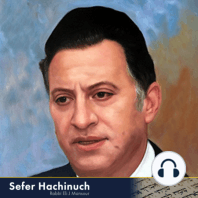20 min listen
Misva #4: Kiddush Ha’hodesh
FromSefer Hachinuch
ratings:
Length:
20 minutes
Released:
Aug 1, 2021
Format:
Podcast episode
Description
The Misva of Kiddush Ha’hodesh requires the leading Sages to declare new months on either the 30 th or 31 st day of the previous month, based upon the testimony of two witnesses who saw the new moon. The source of this Misva is G-d’s command to Moshe and Aharon in Egypt before the Exodus, “Ha’hodesh Ha’zeh Lachem Rosh Hodashim” – “This month is for you the first of the months” (Shemot 12:2). As the Sefer Ha’hinuch explains, this verse is understood to mean that when the new moon is sighted, the new month is to be declared. Bet Din interrogates the witnesses, and then proclaims, “Mekudash” – that this day is Rosh Hodesh, the first day of the new month. The Sefer Ha’hinuch clarifies that this Misva also includes the obligation of “Ibur Shana” – the declaration of a leap year when it becomes necessary to adjust the calendar. As opposed to the solar calendar, which is based upon Earth’s 365-day revolution around the sun, the Jewish calendar follows a lunar-based system, with months being determined based on the moon’s revolution around Earth. However, twelve revolutions of the moon take only 354 days – 11 days fewer than Earth’s revolution around the sun, which means that the Jewish year is 11 days shorter than the solar year. The Torah requires ensuring that Pesach is observed in the springtime (“Shamor Et Hodesh Ha’abib Ve’asita Pesach” – Debarim 16:1), and Sukkot is called “Hag Ha’asif” – the festival of the completion of the harvest (Shemot 34:22) and must be celebrated at the time of the gathering of the harvested produce (Debarim 16:13). Therefore, it becomes necessary to occasionally adjust the Jewish calendar to keep it in sync with the solar calendar. This is done by the addition of an entire month – a second Adar – every two or three years. (The Jewish calendar differs in this respect from the system used by the Moslems, which is based solely on the lunar cycle, and which results in Ramadan, for example, falling at all different times of the year.) This obligation of “Ibur Shana,” to add a month to ensure that the holidays fall in their appropriate seasons, is included in the obligation of Kiddush Ha’hodesh. As mentioned, the command of “Ha’hodesh Ha’zeh Lachem” was directed to Moshe and Aharon, the nation’s spiritual leaders at that time. The Rabbis deduced on this basis that the Misva of Kiddush Ha’hodesh is charged upon the leaders of the generation, the foremost scholars who have received Semicha – formal ordination from a Rabbi who himself received ordination and is part of the chain dating back to Moshe Rabbenu. A Rabbi can perform this Misva only in Eretz Yisrael. However, if he received Semicha in Eretz Yisrael and then moved to the Diaspora, he can nevertheless perform this Misva if he is recognized as the greatest Rabbi in the world in his time. The Sefer Ha’hinuch writes that a qualified Rabbi who, for whatever reason, refrains from involving himself in Kiddush Ha’hodesh is liable to severe punishment, because he causes the holidays to be observed in the wrong time. Today, we no longer have “Semuchim” – Rabbis with formal Semicha, because the chain of Semicha was broken many centuries ago. The Gemara explains that Hillel, a grandson of Rabbi Yehuda Ha’nasi, established the Jewish calendar for centuries into the future, and he effectively “declared” all the new months henceforth. The Sefer Ha’hinuch writes that all the new months and leap years were arranged by Hillel’s system until the time when Eliyahu Ha’nabi will arrive. Once Mashiah comes, we will return to the original system of witnesses testifying to the sighting of the new moon, and the declaration of new months based on their testimony. In the Book of Vayikra (23:4), the Torah says about the holidays, “Tikre’u Otam Be’mo’adam” – “you shall declare them at their times.” The Gemara notes that the word “Otam” (“them”) in this verse is written without the letter “Vav,” such that it may be read as “Atem” – “you.” This word, the Gemara establishes, indicate
Released:
Aug 1, 2021
Format:
Podcast episode
Titles in the series (100)
Misva #8: Leaving Over Meat of the Korban Pesach: Daily Sefer Hachinuch - Brought to you by itorah.com by Sefer Hachinuch
